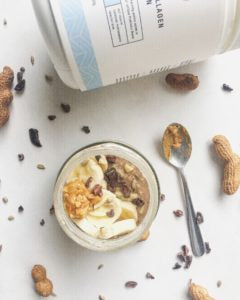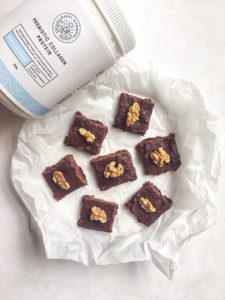15 Collagen Peptides Recipes To Make You Forever Young
Contents:
What are Collagen Peptides? Top 6 Science-Backed Collagen Peptides Benefits- Collagen Peptides May Promote Younger-Looking Skin and Healthy Hair
- Collagen Peptides May Boost Gut Health
- Collagen Peptides May Ease Joint Pains and Promote Muscle Recovery
- Collagen Peptides May Help to Kick-Start Your Metabolism
- Collagen Peptides Provide You With An Abundance of Natural Energy
- Collagen Peptides May Improve Sleep Quality
- Energy Protein Balls
- Pancakes
- Overnight Oats
- Brownies
- Berry Smoothie
- Greens Smoothie
- Coconut Smoothie
- Cacao Smoothie
- Almond Coffee Smoothie
- Coconut Kale Smoothie
- Kiwi Smoothie
- Peanut Butter Smoothie
- Mango Matcha Smoothie
- Cacao Mint Smoothie
- Prune Almond Smoothie
What are Collagen Peptides?
Collagen is the largest structural protein in the body and is derived of the amino acids: Glycine, Arginine, Proline and Hydroxyproline. These key amino acids are an integral part in the health and maintenance of major structures- from our bones, to our muscles, tendons and skin. It essentially mimics glue in a sense that it quite literally holds the body together and provides the strength we need to carry out of lives. So yeah, it's kind of a big (huge) deal. So, how does collagen differ from collagen peptides? Although both are made up of the same amino acids, their properties greatly differ. A key difference is the makeup of their amino acids. Due to their shorter chains, collagen peptides are more bioavailable and are readily broken down into a much simpler form allowing for them to enter the bloodstream at a much quicker rate. Following absorption, collagen peptides then get straight to work by traveling to different tissues within the body to repair our skin, bones and joints. Thanks to its high concentration of amino acids, our cells also use it for energy.Top 6 Science-Backed Collagen Peptides Benefits
1. Collagen Peptides May Promote Younger-Looking Skin and Healthy Hair
As mentioned earlier, collagen accounts for a huge percentage of our skin, and evidence indicates that consuming collagen could be a key contributing factor for the maintenance of youthful skin. A particular study of interest saw 69 women take daily supplements of collagen peptides over an eight-week period and resulted in reports of improved skin appearance, including increased skin elasticity. Additionally, supplementing with collagen for 60 days showed promising results in another study with participants noting firmer skin and improved skin elasticity. In fact, after just 8 weeks, older women noticeably reduced wrinkles and skin dryness. Evidence also suggests that collagen is important for strong and healthy hair as it helps to increase blood flow in the body, resulting in the provision of essential amino acids and nutrients to the scalp.2. Collagen Peptides May Boost Gut Health
Leaky gut and various other gut syndromes allows for the build-up of toxins and harmful bacteria to pass through the intestine and enter the bloodstream, leading to inflammation and an array of autoimmune conditions. As collagen helps the body form connective tissue and works to repair and strengthen the lining of the gut, it can be beneficial in treating these conditions. Thanks to its high concentration of glycine, collagen can help to reduce acid reflux and its associated symptoms, allowing the body to produce more stomach acid and aid in digestion. Further evidence also proves its effective towards strengthening the intestinal barrier of the digestive tract. The study found that high concentrations of amino acids (coming from collagen) reduced inflammation and held numerous other protective effects against Irritable Bowel Disease.3. Collagen Peptides May Ease Joint Pains and Promote Muscle Recovery
The rapid breakdown of collagen in the joints leads to an array of concerns, such as joint pain, stiffness, and inflammation. As studies show, supplementing with collagen protein can help tackle the root cause of these concerns. The first study involved the supplementation of hydrolysed collagen peptides for athletics. Over a six-month period, tests revealed improvements in joint pains as well as a respective boost in the density of cartilage, making their joints more flexible and in turn, more resilient to injury. To support these findings, an additional study tested the influence of collagen for arthritis using a placebo or one of four varied dosages of oral collagen. After its 24-week completion, patients experienced significant improvements for their joint pains. More impressively, even those taking the lowest amount of collagen also reported positive improvements over those taking the placebo.4. Collagen Peptides May Help to Kick-Start Your Metabolism
As collagen peptides are easily broken down and absorbed, they're an efficient way to boost the amount of protein consumed in the diet. This increase in protein can then increase your metabolism by adding lean muscle mass and helping with the conversion of important nutrients. To support this, a clinical study showed that hydrolysed collagen acts as an effective, natural appetite suppressant and contributes to weight loss promotion due to their satiating effects. In particular, additional research proved that due their amino acid profile, collagen peptides are more superior than other protein types for promoting satiety. Impressively, participants took supplements of protein types: whey, soy, and casein, and reported feeling 40% fuller after having the same quantity of collagen peptides and ate less at their next meal compared to those consuming the other types.5. Collagen Peptides Provide You With An Abundance of Natural Energy
Whilst glycine is responsible for several roles in the body, it is particularly effective for the biosynthesis of creatine- which serves as the energy fuel for our muscles. A study analysing the influence of creatine for athletic performance found that creatine significantly boosted energy levels, leading to improved performance. As well as this, it was seen to be effective for post-exercise and recovery by helping with the repair and maintenance of muscle tissue.6. Collagen Peptides May Improve Sleep Quality
As mentioned earlier, glycine is an amino acid prominently found in collagen and also happens to calm the nervous system as it is an inhibitory neurotransmitter. A particular study looking at its effects for sleep quality found that glycine before bed not only helped individuals with sleep troubles fall asleep quicker, but also resulted in a deeper state of sleep with less participants reporting feelings of daytime drowsiness. In a similar case, people also reported feeling less fatigued throughout the day and far more focused after the addition of glycine.15 Collagen Peptides Recipes To Make You Forever Young
HEALTHY TREATS
1. Energy Protein Balls
- ¼ cup desiccated coconut (for rolling)
- ½ cup almond meal
- 2 scoops Prebiotic Collagen Protein
- 2 heaped tbsp Natural peanut butter
- 1 tbsp Organic cacao powder
- 1 tsp cinnamon
- 2 tbsp pumpkin seeds/mixed seeds of choice
- ¼-½ cup warm water (adding more/less as needed)
- Add all ingredients to food processor and blitz until well-combined (adding more water if necessary).
- With your palm, roll mixture into bite-sized balls and coat in coconut.
- Refrigerate for an hour before enjoying.

2. Pancakes
- 1 cup gluten-free oats
- 1 egg (lightly beaten)
- 1 ½ tsp baking powder
- ½ tsp baking soda
- 2 scoops Prebiotic Collagen Protein
- 1 tbsp coconut oil (for frying)
- Combine all ingredients in a large mixing bowl and mix until well-incorporated.
- Heat coconut oil in medium-sized pan, and once warm, slowly pour in mixture using a spatula.
- Once small bubbles start to appear, flip over and continue cooking the other side until golden brown.

3. Overnight Oats
- ¼ cup almond milk
- ¼ cup gluten-free oats
- 1 tsp Organic cacao powder
- 1 scoop Prebiotic Collagen Protein
- 1 tsp chia seeds
- 1 tsp LSA mix
- Add all ingredients to jar and stir throughly to combine.
- That's it! Place lid on jar and refrigerate overnight.

4. Brownies
- ½ cup Natural Greek yoghurt
- 1/4 cup Organic cacao powder
- 2 scoops Prebiotic Collagen Protein
- 1 tsp LSA mix
- 1 tsp chia seeds
- 1 tbsp Organic cacao nibs
- 2 ripe bananas
- Preheat oven to 170ºC and line a baking tray with baking paper.
- In a food processor, combine all ingredients until completely incorporated together.
- Spoon mixture into baking tray and bake until set (mixture should have a fudge consistency).

SMOOTHIES
5. Berry Smoothie
- 1 handful mixed berries (frozen)
- 1 cup coconut water
- 1 scoop Prebiotic Collagen Protein
- 1 tsp LSA mix
6. Greens Smoothie
- 1 banana
- 1 cup almond milk
- 1 scoop Prebiotic Collagen Protein
- 2 kale leaves
- 1 small handful spinach leaves
7. Coconut Smoothie
- 1 cup coconut milk
- 1 banana
- 1 tsp hemp seeds
- 1 scoop Prebiotic Collagen Protein
8. Cacao Smoothie
- 1 tsp Organic cacao powder
- 1 banana
- 1 tsp chia seeds
- 1 scoop Prebiotic Collagen Protein
- 1 cup almond milk/coconut water
9. Almond Coffee Smoothie
- 6 raw almonds
- 1 tsp instant coffee
- 1 scoop Prebiotic Collagen Protein
- 1 cup almond milk
- 1 tsp cinammon
- 1 tsp nutmeg
10. Coconut Kale Smoothie
- 2 kale leaves
- ½ cup coconut milk
- 1 banana (frozen)
- 1 scoop Prebiotic Collagen Protein
- 1 tbsp desiccated coconut
11. Kiwi Smoothie
- 1/2 cup cold water/coconut water
- 1 cup spinach
- Squeeze lime juice
- 1 kiwi, roughly chopped
- 1 scoop Prebiotic Collagen Protein
12. Peanut Butter Smoothie
- 1 heaped tbsp natural peanut butter
- 1 banana
- 1 scoop Prebiotic Collagen Protein
- 1 tsp ground flaxseed
13. Mango Matcha Smoothie
- ½ cup mango chunks (frozen)
- 1 scoop Prebiotic Collagen Protein
- 1 tsp matcha powder
- 1 cup coconut water
14. Cacao Mint Smoothie
- 1 tsp Organic cacao powder
- 1 tbsp Organic cacao nibs
- 3 mint leaves
- 1 scoop Prebiotic Collagen Protein
- 1 cup almond milk
15. Prune Almond Smoothie
- 5 prunes
- 1 small handful raw almonds
- 1 tsp ground flaxseed
- 1/4 cup gluten-free oats
- 1 cup almond milk
- 1 scoop Prebiotic Collagen Protein



